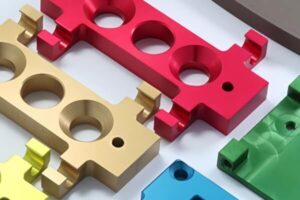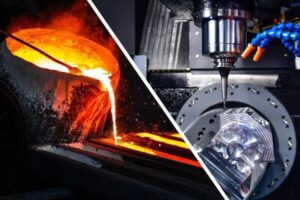In today’s world of metal making, aluminum alloys are key in CNC machining. They are light but strong, making them a top pick for many jobs. Knowing which alloys work best for CNC machining is vital for project success.
The right alloy can make machining better and last longer. This article will look at the top aluminum alloys for CNC machining. We’ll see why they’re great for your next project.
Key Takeaways
- Aluminum alloys are crucial in CNC machining because of their special traits.
- Picking the right alloy boosts both function and efficiency in machining.
- Knowing what each alloy offers helps make better choices.
- Light materials like aluminum can save costs in many uses.
- Strong and flexible aluminum alloys fit many manufacturing needs.
Understanding CNC Machining
CNC machining is a cutting-edge method that uses computer technology. Knowing what CNC means helps us see how it makes production better. It replaces old ways of making things, making tasks more efficient and precise.
What is CNC Machining?
CNC machining means using a computer to control tools. It uses software to guide machines, making detailed designs possible. This way, making complex parts is faster and more accurate than before.
The Role of CNC in Aluminum Fabrication
CNC is key in aluminum work. It helps make precise cuts and shapes in aluminum. This leads to better quality products, which is vital in many industries.
| Feature | CNC Machining | Traditional Machining |
|---|---|---|
| Precision | High | Variable |
| Speed | Fast | Slower |
| Complexity | High | Limited |
| Cost Efficiency | Cost-effective for high volume | Better for low volume |
Benefits of Using Aluminum in Machining
Aluminum is key in machining and metal fabrication. It offers many benefits, making it a favorite in many industries. Its special properties help make high-quality aluminum parts. These parts greatly improve performance and use in different applications.
Lightweight and Strong Properties
Aluminum is known for being both light and strong. This lets engineers and designers make parts that are efficient and durable. Its strength-to-weight ratio is better than many other materials.
This makes aluminum perfect for industries that need to save weight without losing strength. The car and plane industries benefit a lot from this.
Corrosion Resistance Advantages
Aluminum also stands out for its resistance to corrosion. This means aluminum parts can handle many environments without losing their function. It prevents rust and wear, making parts last longer.
This is great for industries that value durability, like the marine and outdoor sectors. It means less need for replacing parts often.
Popular Aluminum Alloys for CNC Machining
Knowing the differences between aluminum alloys is key for CNC machining. Two top choices are 6061 aluminum and 7075 aluminum. Each has special qualities that boost the strength and life of parts made.
6061 Aluminum: Versatility and Strength
6061 aluminum is known for being strong and versatile. It’s great for both building and welding, making it a favorite in many fields. It’s used in car parts and building frames.
It also resists corrosion well, lasting long in many settings.
7075 Aluminum: High-Stress Applications
7075 aluminum is top-notch for handling heavy loads. It’s a go-to for the aerospace and defense sectors. Its strength makes it perfect for plane parts and fast cars.
Though it’s harder to machine, its benefits make it worth the extra work for critical uses.
| Property | 6061 Aluminum | 7075 Aluminum |
|---|---|---|
| Strength | Moderate to high | Very high |
| Weldability | Good | Poor |
| Corrosion Resistance | Excellent | Moderate |
| Typical Applications | Automotive, marine, structural | Aerospace, military |
Understanding the strengths and weaknesses of these alloys helps businesses choose better for CNC machining. The right choice can improve product quality and streamline manufacturing.
Which Aluminum Alloys Are Ideal for CNC Machining Service and Why?
Choosing the right aluminum alloys for CNC machining is key for top performance. Mechanical properties, use, and cost are important. Knowing these helps manufacturers pick the best materials for their projects.
Factors That Affect Alloy Selection
Many factors influence choosing aluminum alloys for precision work. Strength and fatigue resistance are crucial in high-stress areas. The environment’s corrosiveness also matters, as does cost, affecting project budgets.
Comparison of Alloys for Specific Applications
| Aluminum Alloy | Tensile Strength (psi) | Common Applications |
|---|---|---|
| 6061 | 45,000 | Aerospace, Automotive |
| 7075 | 83,000 | Military, Aerospace |
| 2024 | 70,000 | Aircraft Structures |
| 5052 | 33,000 | Marine, Fuel Tanks |
The table shows the tensile strength of different aluminum alloys and their uses. It shows how alloy choice affects performance in machining. Knowing mechanical properties and applications helps pick the right alloys for precise machining.
Considerations for CNC Machining Services
Choosing the right CNC machining services is important. You need to find a reliable machining manufacturer. They should know how to work with aluminum well.
Look at their experience, the quality of their tools, and how much they can produce. Making the right choice can make your project a success.
Choosing the Right CNC Machining Manufacturer
Check if the manufacturer has a good track record. A company with experience and modern machines can meet your needs. Read what other clients say and look at their past work.
Importance of Precision in Fabrication
Getting precise CNC machining is key for quality aluminum parts. Small mistakes can cause big problems later. Make sure the manufacturer focuses on precision to get parts that work as they should.
Choosing the Right Aluminum Alloy for Your Project
Choosing the right aluminum alloy is key for making high-quality parts. It’s important to know about mechanical properties, workability, and formability. These factors affect how well the part will perform and last.
Assessing Mechanical Properties
When looking at different aluminum alloys, mechanical properties matter a lot. Tensile strength shows how much load an alloy can handle before breaking. Ductility tells us how much an alloy can bend without breaking.
These properties are crucial for parts that need to be strong. By checking these, you can pick the best alloy for your project.
Understanding Workability and Formability
Workability and formability show how easy it is to shape or machine an alloy. Each alloy acts differently during machining, affecting things like cutting speed and tool choice. Knowing this helps make complex designs without losing material quality.
Choosing alloys that are easy to work with can make production faster. It also improves the quality of aluminum parts.
Common Applications of Aluminum CNC Machined Parts
Aluminum CNC machined parts are key in many industries because they are both light and strong. They are used in the aerospace, automotive, and consumer electronics sectors. This shows how versatile and precise aluminum alloys can be.
Aerospace Components
In aerospace, materials must be both light and strong. Aluminum parts fit the bill for making brackets, frameworks, and outer surfaces. CNC machining ensures these parts are made with high precision. This is crucial for safe and efficient flight operations.
Automotive Parts
The auto industry uses aluminum alloys to make parts that are lighter and more fuel-efficient. Engine blocks, transmission casings, and wheels are often made from aluminum. CNC machining allows for complex shapes and tight tolerances, making these parts reliable for high-performance vehicles.
Consumer Electronics
Aluminum is popular in consumer electronics for its attractive look and light weight. It’s used in smartphones, laptops, and tablets to improve both looks and function. Aluminum alloys help manufacturers create durable yet sleek designs.
| Industry | Common Applications | Benefits of Aluminum CNC Machined Parts |
|---|---|---|
| Aerospace | Brackets, frameworks, external surfaces | Lightweight, high strength-to-weight ratio |
| Automotive | Engine blocks, transmission casings, wheels | Improved fuel efficiency, reliability, complex shapes |
| Consumer Electronics | Smartphones, laptops, tablets | Durability, aesthetic appeal, lightweight |
CNC Machining Services: What to Expect
Getting into CNC machining opens up a lot of possibilities. It’s great for both individuals and businesses. Knowing what’s out there, especially online, can make your project easier and faster. There are many services to choose from, so you can get high-quality results.
Online CNC Service Options
Online CNC services have many benefits. They make ordering easy and prices competitive. You can upload your designs and get quotes and timelines quickly. The perks include:
- Easy design submission.
- Quick feedback and changes.
- Many machining options and materials.
These platforms give detailed estimates. This helps you plan and execute your project better. Knowing what’s available helps you choose the right service for your needs.
Cost Considerations and Budgeting
Cost is key when planning CNC machining. You need to budget right to keep your project affordable. Costs depend on:
| Factor | Description |
|---|---|
| Material Type | Different materials cost differently. |
| Complexity of Design | More complex designs take longer to make. |
| Volume of Production | Bigger orders cost less per piece. |
Understanding these factors helps you talk prices and set budgets. This way, you can manage your money well and still get top-notch machining.
Aluminum Machining Techniques to Know
Aluminum machining uses different processes to make the most of aluminum alloys. Each method has its own benefits. This lets machining companies pick the best one for their projects. Knowing these processes is key to getting the results you want in aluminum machining.
Machining Processes for Aluminum Alloys
Milling, turning, and drilling are top choices for working with aluminum alloys. Each has its own uses and advantages:
- Milling: Great for making complex shapes and details, milling cuts precisely and shapes accurately.
- Turning: Perfect for making round parts, turning ensures smooth surfaces and tight fits.
- Drilling: Key for making holes, drilling can be adjusted for size and depth, offering design flexibility.
Tooling Choices for Efficient Machining
Picking the right tools is crucial for efficient and quality machining. Consider these factors:
- Coating: Tool coatings boost durability and cut down on friction, making them great for aluminum work.
- Geometry: The tool’s design should fit the machining process for best chip removal and finish.
- Material: High-speed steel and carbide are strong and wear-resistant, ideal for aluminum machining.
Quality Control in CNC Machining
Quality control is key in CNC machining. It ensures aluminum parts are made to exact standards. This detail is crucial for the parts to work right and make customers happy.
Importance of Tolerances in Production
Tolerances are the allowed size changes in making aluminum parts. Keeping these tolerances is vital for parts to fit right in assemblies. A good machining company sticks to strict tolerance rules to keep quality high.
If tolerances are ignored, it can cause big problems. This includes extra costs and delays, affecting both time and money.
Testing and Inspection Methods
Many tests and checks are used in CNC machining to ensure quality. These include looking at size and surface finish. Some common methods are:
- Visual Inspection
- Laser Scanning
- CMM (Coordinate Measuring Machine) Evaluation
- Surface Roughness Measurement
These steps make sure every part made by CNC machining is top-notch. This means customers get reliable and strong products.
| Inspection Method | Description | Purpose |
|---|---|---|
| Visual Inspection | Manual check for visible defects | Quick assessment of overall quality |
| Laser Scanning | Captures detailed geometric data | High precision measurement |
| CMM Evaluation | Automated measurement using a probe | Accurate dimension checks |
| Surface Roughness Measurement | Assesses the texture of a surface | Ensures performance and aesthetic requirements |
Conclusion
Understanding the right aluminum alloys for CNC machining is key for top results. This article showed why picking the right materials matters. It talked about how different aluminum alloys offer unique benefits for machining.
The details of machining are also important for making quality parts. Knowing how to work with different alloys improves CNC machining projects. This includes understanding workability, formability, and mechanical properties.
Lastly, keeping quality control in mind is crucial. This ensures parts meet the required standards. With the knowledge from this article, people and businesses can make informed choices. This leads to successful CNC machining projects.


















